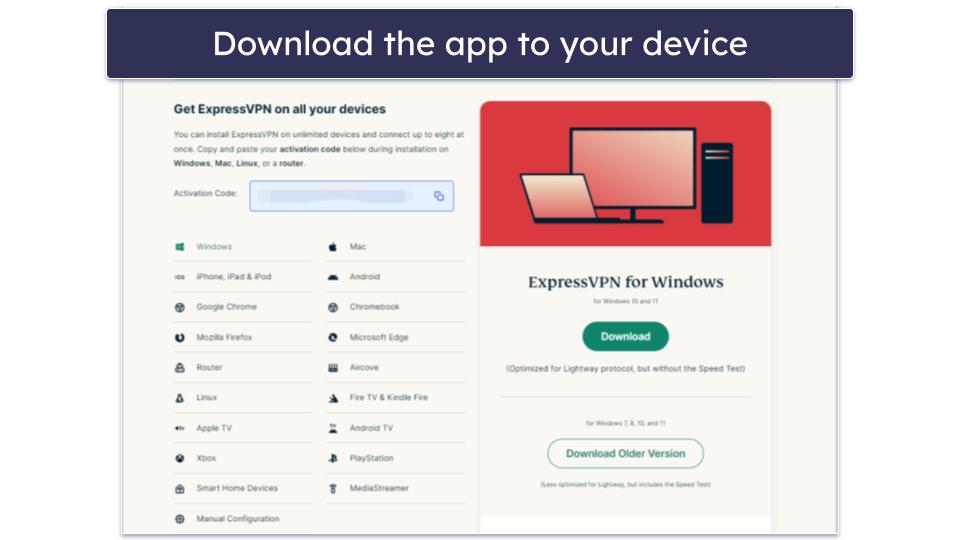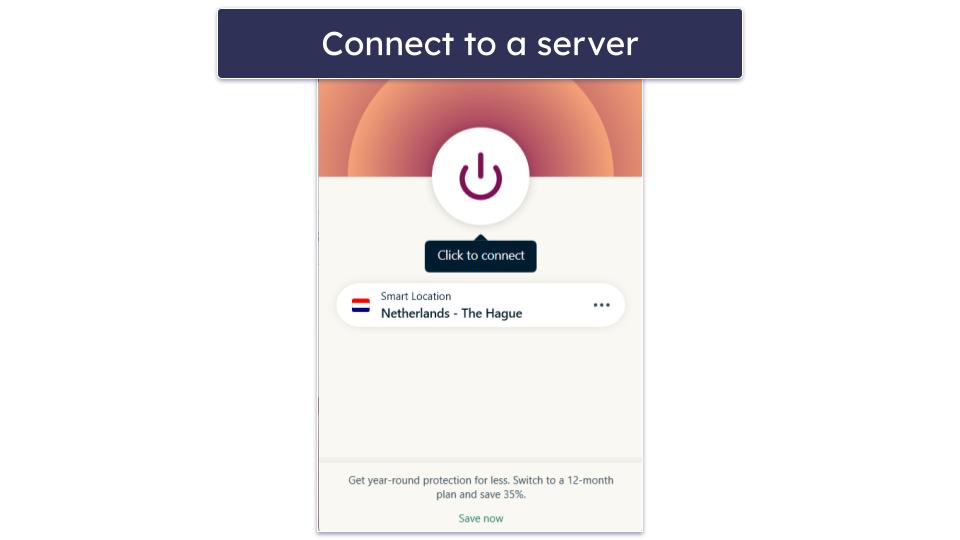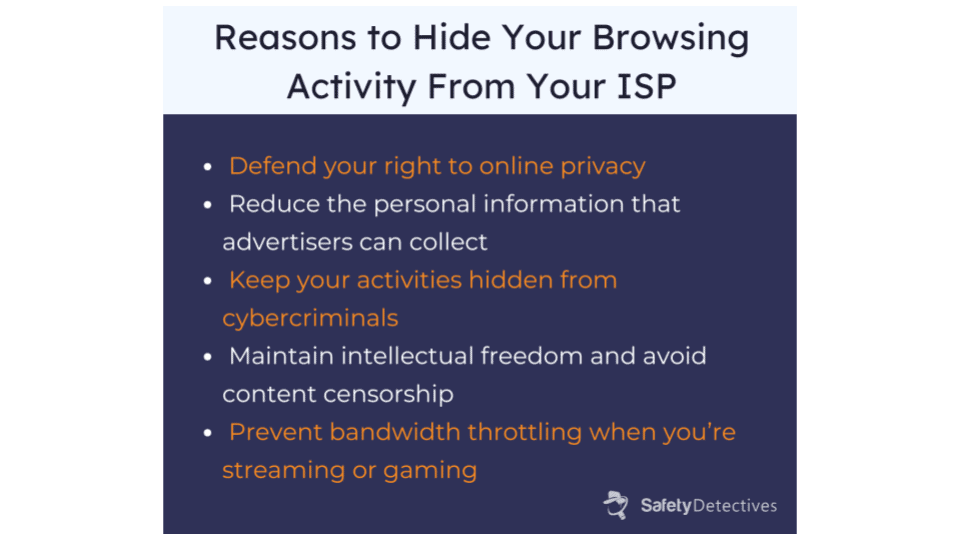
Paige Henley
Updated on: January 26, 2025
Fact-checked by Kate Davidson
Short on time? Here’s how to hide your browsing activity from your internet service provider in 2025:
- Download and install a reliable VPN: The best VPN for hiding your browsing history from your ISP is ExpressVPN. It works on most devices, including Macs, Windows PCs, iPhones and iPads, Android phones and tablets, and Chromebooks.
- Connect to a server: Open your VPN app and choose any server. For optimal connection speeds, choose a server close to you.
- Browse the internet privately. That’s it! You can now be confident that your browsing activity is hidden from your ISP.
Your internet service provider (ISP) can track everything you do online — including your browsing history. Thankfully, there are several reliable ways to hide your activity from your ISP.
The simplest and most effective method is to use a virtual private network (VPN). A VPN routes all your traffic through a secure, encrypted tunnel, preventing your ISP from seeing or tracking your online activity. Even if someone intercepts your data, this secure tunnel keeps it unreadable.
Choosing the right VPN is crucial for maximum privacy. After testing dozens of options, including free ones, I’ve found ExpressVPN to be the best overall. That said, a VPN isn’t the only way to safeguard your browsing history. Follow these simple tips and tricks to keep your browsing history hidden from your ISP — once and for all. Editors’ Note: ExpressVPN and this site are in the same ownership group.
BROWSE PRIVATELY WITH EXPRESSVPN
How to Hide Your Browsing History From Your ISP: Step by Step Guide
Step 1. Download and Install a Reliable VPN
A VPN is an excellent tool that protects your online privacy by encrypting your internet connection and concealing your browsing activity from your ISP. In this example I’ll be using ExpressVPN, although there are many other good VPNs too. Here’s how to download, install, and use ExpressVPN (the process will be similar for most top VPNs).
- Head to ExpressVPN’s website, choose a plan that fits your needs, and subscribe.

- Once you’ve signed up, download and install the app on your device.

Step 2. Connect To a Server
Once you’ve installed a VPN of your choice, open the app on your device and connect to a server. This will create a secure tunnel for your internet traffic so your ISP can’t monitor or record what you’re doing.

Most VPNs offer a “quick connect” button on the main screen, which works well for most use cases. It’s also easy to select a specific server location, and doing so can sometimes improve performance.
Step 3. Enjoy Private Browsing!
That’s all there is to it — regardless of the server you choose, your internet traffic will now be completely hidden from your ISP.
Best VPNs for Hiding Your Browsing History From Your Internet Provider in 2025
Quick summary of the best VPNs for hiding your browsing history from your internet provider in 2025:
- 🥇ExpressVPN — Best overall VPN for hiding your browsing activity from your ISP.
- 🥈Private Internet Access — Top VPN for hiding all your browsing activity on mobile.
- 🥉CyberGhost VPN — Great beginner-friendly VPN for privacy-conscious users.
Editors’ Note: Intego, Private Internet Access, CyberGhost and ExpressVPN are owned by Kape Technologies, our parent company
Other Ways to Hide Your Browsing History From Your ISP
Though a VPN is the best way to hide your internet usage, it’s by no means the only way. Here are some additional methods you can use:
- Use a proxy: A proxy can mask your IP address and redirect your web traffic through an intermediary server. However, while it can hide your activity from the websites you visit, it doesn’t provide encryption for all traffic, meaning your ISP can still see which sites you’re accessing.
- Use the Tor browser: The Tor (The Onion Router) browser encrypts your browsing traffic and routes it through multiple servers, making it near-impossible for your ISP to track your online activity. That said, it only applies to browser traffic and can significantly slow down your connection speed.
- Switch to HTTPS websites: HTTPS encrypts your connection to websites, ensuring your ISP can’t see what you’re doing on those sites. However, your ISP can see the main URL of the sites you’re visiting. For example, your ISP might see that you’re visiting YouTube.com, but when you use HTTPS, they won’t be able to see what videos you’re watching.
- Use a private search engine: A search engine like DuckDuckGo keeps your search queries private by not storing your data or linking searches to you. However, it won’t hide other online activities like streaming or downloading, which a VPN can do.
- Configure a custom DNS: Using a DNS resolver like Cloudflare (1.1.1.1) or Google Public DNS (8.8.8.8) hides your browsing history from your ISP’s DNS servers. However, it doesn’t encrypt the rest of your internet traffic, which leaves your other activities visible.
- Use Tails: Tails (The Amnesic Incognito Live System) is a secure operating system that routes all your traffic through Tor, hiding your browsing activity from your ISP. The catch is that you’ll need to boot into Tails from a USB drive each time, making it more cumbersome than a VPN.
- Use SSH Tunneling: Secure Shell (SSH) tunneling lets you encrypt specific traffic by routing it through a remote server. It’s commonly used for securing data over unsecured networks, but unlike a VPN, it requires more technical knowledge and doesn’t provide a blanket privacy solution for all traffic.
Does “Private Browsing” or “Incognito Mode” Hide What You Do Online?
No, these modes don’t hide your online activities from your ISP. When you use these modes, your browser doesn’t save your browsing history, cookies, or search queries. Once you close the session, all temporary data, including logins and downloads, is deleted from your device. This is only useful for keeping what you do online hidden from anybody else who uses your device — just remember to close incognito mode when you’re done!
However, Incognito Mode does not protect your activity from external tracking. Your ISP can still monitor the websites you visit, as it doesn’t hide your IP address. Additionally, websites can still use cookies and other tracking mechanisms to monitor your behavior during the session.
Network administrators or anyone with access to your internet connection can also see what you’re doing online. If you’re looking for true anonymity or to hide your activity from your ISP, you’ll need to use a VPN or a privacy-focused browser like Tor.
Why Your ISP Tracks Your Browsing Activity
Your ISP tracks your online activity for a variety of reasons, ranging from network optimization to legal requirements, along with some other more sinister reasons. Let’s take a closer look at why you might be tracked.
Targeted Advertising
ISPs can collect data about your browsing habits and use it for targeted advertising. By analyzing the websites you visit, your interests, and even demographic details, they can serve you much more tailored ads. This data is often sold to advertisers or used to build user profiles.
Targeted advertising raises concerns because it involves the collection of personal information, often without your explicit consent. This practice can feel invasive, as it allows ISPs and advertisers to know more about your preferences and behaviors than you might realize.
Network Optimization
ISPs monitor your browsing patterns to optimize their networks and improve their networks’ performance. By tracking data usage and peak traffic times, they can manage bandwidth and allocate resources where demand is highest. This allows them to adjust speeds and improve the overall experience for users.
Additionally, ISPs use this data to make decisions about upgrading infrastructure or prioritizing certain areas based on traffic needs. For instance, they might identify regions with growing internet demand and direct resources toward expanding capacity to meet these needs.
Compliance with Regulations
In some regions, ISPs are legally required to store user data for a specific period to comply with data retention laws. These laws mandate that ISPs collect and store information such as website visits, search queries, and even emails in case law enforcement agencies need access for investigations.
This is often done under the guise of protecting national security or fighting crime, but it raises significant privacy concerns. The collected data can be handed over to law enforcement without a user’s consent or knowledge, putting your personal online habits at risk of being scrutinized by authorities.
Censorship and Content Restrictions
In certain countries, ISPs are compelled by the government to monitor and restrict access to specific websites or content. Governments use ISPs as a means of enforcing internet censorship, blocking access to sites deemed inappropriate, politically sensitive, or in violation of local laws.
This practice can severely limit freedom of speech and access to information. In some cases, users are unaware that their ISP is blocking access to specific content. It’s very difficult to bypass these restrictions without using a good VPN.
Bandwidth Throttling
ISPs can monitor your data usage and selectively throttle your internet speeds based on your online activity. For example, if you stream a lot of video content or play online games, your ISP may slow down your connection to manage network congestion or prioritize certain types of traffic.
While this is sometimes done to ensure fair distribution of bandwidth, it can also feel unfair when your activities are deliberately slowed down. Using a VPN can help bypass throttling as it hides the type of activity you’re engaging in, making it harder for ISPs to selectively reduce your speeds.
Why You Should Hide Your Browsing Activity From Your ISP
Hiding your browsing activity from your ISP is crucial for a variety of reasons. Here are some of the most important ones:
- Defend your right to privacy: By hiding your browsing history, you prevent unnecessary surveillance of your online activity. A VPN like ExpressVPN, for example, ensures that your browsing history and activity remain private.
- Minimize personalized ads: When your browsing activity is tracked, it fuels the collection of data for personalized ads. By masking your activity, you reduce the amount of information advertisers can use, helping you avoid being constantly targeted by intrusive ads. You can also use a good ad blocker to block ads entirely, such as Private Internet Access’s MACE.
- Safeguard against cybercrime: Your online habits can be used by cybercriminals to exploit your identity. By obscuring your browsing activity, you make it harder for hackers to profile you and potentially steal your personal information.
- Maintain intellectual freedom: If your ISP tracks your activity, they can restrict or censor certain content based on your location or government regulations. Hiding your browsing activity allows you to access information freely, bypassing censorship and exploring a wider range of ideas.
- Prevent bandwidth throttling: ISPs can selectively slow down your connection depending on the type of activity you’re engaging in, like streaming or gaming. By encrypting your traffic with a VPN, you can avoid throttling and maintain a fast, uninterrupted online experience.
Editors’ Note: Intego, Private Internet Access, CyberGhost and ExpressVPN are owned by Kape Technologies, our parent company
Frequently Asked Questions
How do you stop your internet provider from seeing your history?
The most effective method to hide your browsing history from your internet provider is to use a virtual private network (VPN). A VPN encrypts your internet traffic and routes it through a secure server, masking your online activity from your ISP. This ensures that even if your ISP monitors your connection, they can’t see what you’re doing online.
You can also consider using privacy-focused browsers like Tor or enabling HTTPS on websites. However, these methods are not as simple as a VPN and may still expose some aspects of your activity to your ISP. A VPN is the best solution for complete privacy.
How do I hide my search history from my Wi-Fi provider?
The best way to hide your search history from your Wi-Fi provider is to use a virtual private network (VPN). A VPN encrypts all your traffic, including search queries, and prevents your Wi-Fi provider from tracking what you search for.
Alternatively, you can use private search engines like DuckDuckGo, which don’t store your search history. However, this won’t hide the websites you visit from your Wi-Fi provider — so using a VPN is the most secure and effective option.
How do I delete browsing history from my internet provider?
Unfortunately, you can’t directly delete your browsing history from your internet provider. ISPs retain browsing data due to legal requirements and for network management purposes. However, using a VPN or privacy tools can ensure that your browsing history remains private moving forward, as a VPN will prevent your ISP from logging your activity.
If you want to prevent future tracking, consider clearing your browser history regularly, using private browsing modes, and implementing additional privacy measures like using Tor or encrypted DNS services. These methods won’t delete past data from your ISP, but they will protect future browsing from being tracked.
How to hide data usage from my internet service provider?
The best approach to hiding data usage from your ISP is to use a VPN. A VPN encrypts your traffic and routes it through secure servers, making it impossible for your ISP to see the type or volume of data you’re using. This effectively hides your data usage from your provider and prevents them from monitoring your activities.





